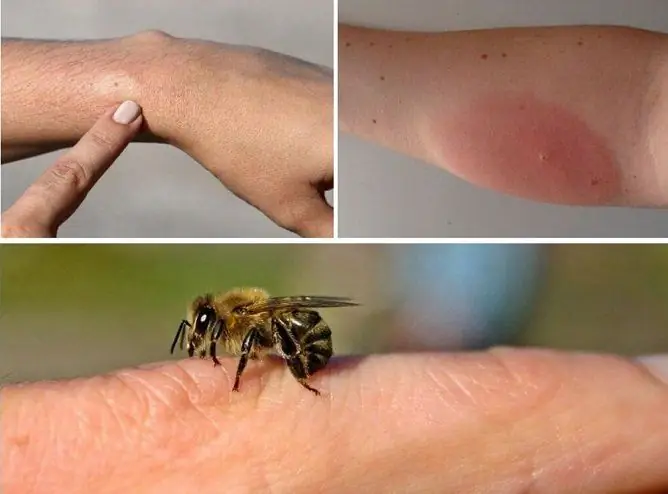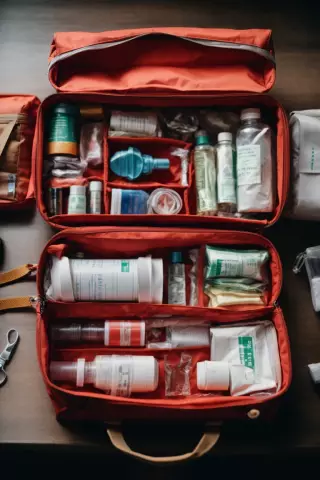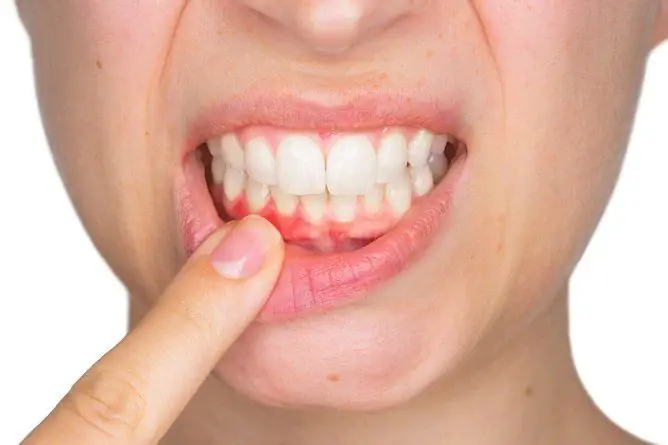- Author Rachel Wainwright wainwright@abchealthonline.com.
- Public 2024-01-15 19:51.
- Last modified 2025-11-02 20:14.
How to relieve swelling from a bee sting
The content of the article:
- How to relieve swelling after a bee sting: first aid
-
How to relieve swelling from a bee sting on the second day
- Drug treatment
- Folk recipes
- What you need to know about edema
- When to see a doctor
- Consequences of a bite
- Video
A bee sting is not only painful, but often dangerous to humans. Swelling, skin redness, itching, and burning may occur immediately after the bite. There are several effective ways to relieve swelling from a bee sting - you can apply a compress, apply ointment, and take antiallergic drugs.
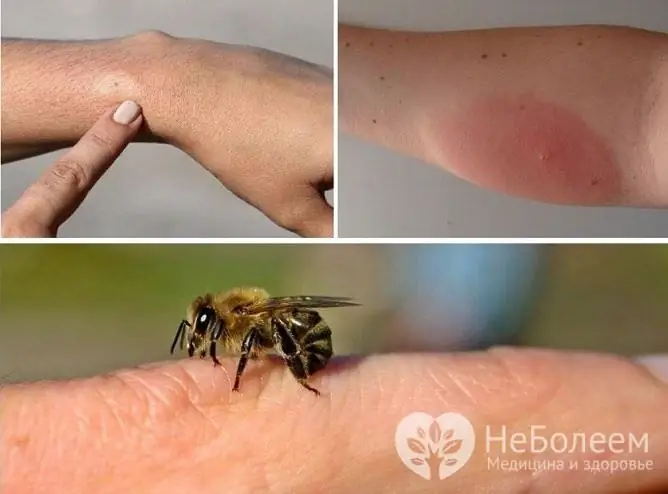
The appearance of a large edema after a bee sting indicates the development of an allergic reaction
How to relieve swelling after a bee sting: first aid
During the bite, the insect releases poison, so you need to act immediately. You can also provide first aid at home. In most cases, general recommendations are enough to avoid unpleasant consequences. What to do with a bee sting:
- To stop the intake of bee venom into the body - you need to carefully pull out the bee sting. To do this, it is better to use tweezers; you should not press on the bite site.
- Treat the bitten area with an antiseptic.
- Apply a cold compress to the swelling site - a napkin or ice soaked in cold water. This will slow down the absorption of the poison into the general bloodstream.
Timely help will help reduce swelling and redness. With a single bite and the absence of allergies, these measures are sufficient. Further treatment is indicated in the development of an allergic reaction to bee venom.
How to relieve swelling from a bee sting on the second day
To reduce the swelling after a day, you need to use medications. Ointments and tablets are prescribed that have antiallergic effect. Additionally, folk remedies can be used at home - compresses, lotions, solutions for skin treatment.
Drug treatment
Drug treatment is prescribed in cases where an allergic reaction has developed - severe swelling, redness of the skin, pain. Both local and systemic drugs are prescribed.
What medications will help remove swelling:
| Group of drugs | Indications, rules of application | Medicines names |
| Antihistamine tablets |
If the swelling persists on the second day, you can take an antihistamine. Drugs from this group reduce the effect of histamine, which is manifested by vasodilation, edema, itching of the skin. There are several generations of antihistamines: 1st generation - has a significant side effect, namely pronounced drowsiness. The drugs of this generation can be prescribed to a child who cannot sleep due to itching of the skin. 2nd generation - does not affect the central nervous system, so it does not cause drowsiness. They can be used by people who drive vehicles or perform other work that requires concentration. The dosage is selected individually, but usually 1 tablet per day is enough. The duration of treatment is on average 4-7 days. |
1st generation (sedatives): Diphenhydramine, Suprastin. 2nd generation (non-sedative): Tsetrin, Loratadin. |
| Glucocorticoid ointments |
You can quickly relieve swelling with ointments that contain glucocorticosteroids. They are powerful anti-allergic agents that treat allergy symptoms. The ointment should be applied in a thin layer to the swollen area. It is enough to use the drug 2-3 times a day. The average duration of use is 3-7 days. Do not use glucocorticosteroid ointment for more than 2 weeks in a row, or if you have any signs of infection. |
hydrocortisone ointment, ointment Akriderm, ointment Beloderm, cream Advantan. |
| Parenteral glucocorticoids |
Inside, glucocorticoids are prescribed only in case of a severe allergic reaction. These are not routine bee stings. The indication for the appointment of glucocorticoids is: • rapid spread of edema; • generalized rash; • airway obstruction and respiratory failure. Parenteral glucocorticoids can be administered 1 time (to relieve symptoms) or a course of several injections. |
Prednisolone, Dexamethasone. |
Folk recipes
Folk remedies can also be used to reduce puffiness. They are less effective, so they are often used concurrently with medications. What folk remedies help relieve swelling:
| Aloe |
The plant reduces signs of inflammation and allergies - swelling, redness. You can squeeze the juice from the aloe or use the whole leaves of the plant. Aloe juice must be diluted, moistened with a piece of gauze and applied to the swollen area. You can also remove the top layer from the sheet, apply the pulp to the skin. |
| Soda |
The baking soda solution will help reduce the symptoms of inflammation. To prepare the solution, dissolve 1 teaspoon of baking soda in 1 glass of water. The resulting solution should be lubricated with the affected area 4-5 times a day. |
| Plantain | Plantain lotions can be used to reduce skin swelling. To do this, grind the plantain leaf, apply the gruel to the affected area for 3 hours. |
What you need to know about edema
The swelling appears due to the increased permeability of the blood vessels. This is due to the action of inflammatory mediators found in bee venom (eg histamine).
In most cases, puffiness occupies a small area - up to 1-2 cm. In this case, we are talking about a local reaction. On palpation, the edema is dense, has clear boundaries.
Less often, swelling spreads over a large area. In this case, this is no longer a local, but a generalized reaction.
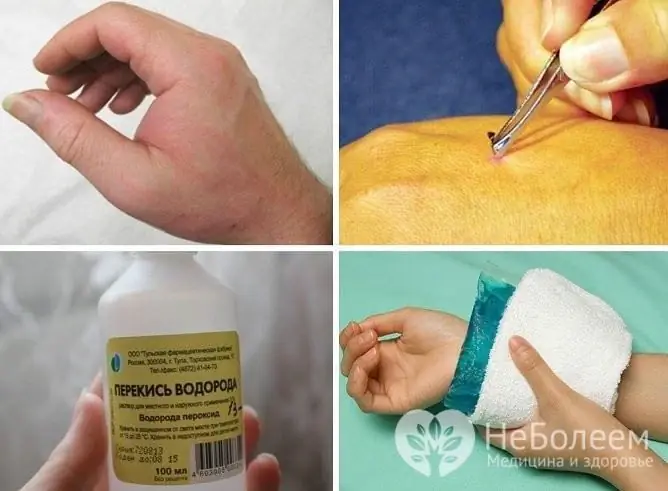
In most cases, with bee stings, you do not need to see a doctor, home measures are enough
When to see a doctor
Usually, bee stings do not cause dangerous consequences, and the swelling goes away on its own. In such cases, you can do without medical assistance. But there are situations when going to a doctor is vital. This is determined by several factors:
| Localization |
The most dangerous bites are in the face, neck, tongue. In these areas, the subcutaneous tissue is loose, so the swelling spreads quickly. However, there is a high risk of airway obstruction. Therefore, if a bee or a wasp has bitten a person in the face, neck, tongue, you need to see a doctor. |
| amount | A single bite poses much less danger to a person than multiple ones, which is associated with the intake of a smaller amount of poison. |
| Susceptibility to allergic reactions | If you have a history of allergic reactions to bee venom, you should immediately consult a doctor. However, allergy symptoms may appear even if they have not previously been observed. |
In addition, you need to see a doctor if you experience the following symptoms:
- difficulty breathing;
- hoarseness of the voice;
- swelling of the tongue;
- lowering blood pressure;
- increased heart rate;
- violation of consciousness.
The presence of these signs indicates the development of anaphylaxis or a severe toxic reaction. Medical attention must be provided immediately.
Consequences of a bite
The main complication that can occur is an allergic reaction. An allergic reaction can be of varying severity, from a mild allergy in the form of a rash to a severe anaphylactic reaction with respiratory distress.
Usually, allergy symptoms (including swelling) regress after 2-3 days.
Bees do not carry infections, so other complications do not develop.
Video
We offer for viewing a video on the topic of the article.

Anna Kozlova Medical journalist About the author
Education: Rostov State Medical University, specialty "General Medicine".
Found a mistake in the text? Select it and press Ctrl + Enter.

